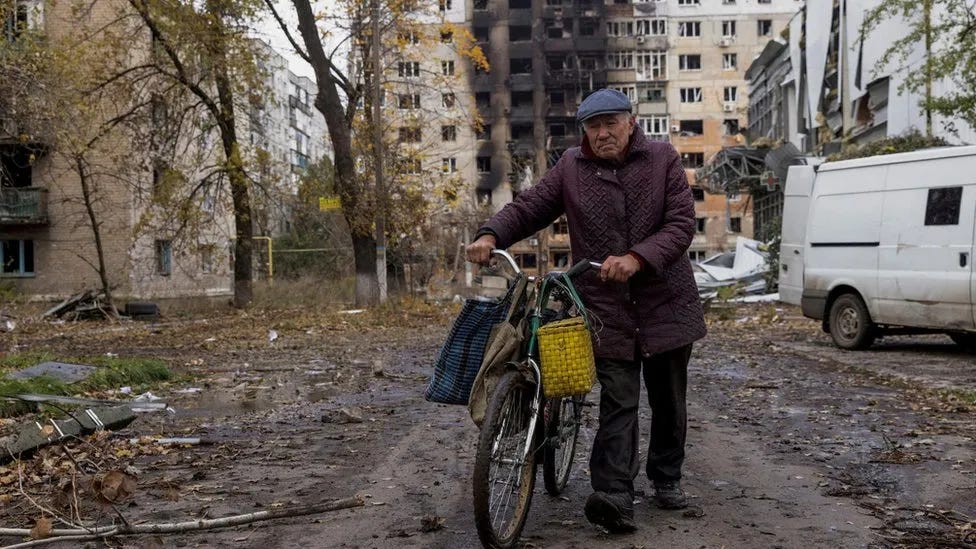
Speaking at the annual Munich Security Conference a few days ago, Ukrainian president Volodymyr Zelensky refused to entertain any idea of peace talks and instead sought more weapons and financial support from his Western allies to “defeat [Vladimir] Putin.”
Zelensky was speaking days after his country’s forces withdrew from Avdiivka, an important town located a few kilometers away from Donetsk city. Russia’s subsequent occupation of the town was perhaps its biggest breakthrough since May 2023 when its forces captured Bakhmut.
The loss of Avdiivka came as the war is set to complete two years on 24 February and amid a decline in the West’s support for Ukraine which has been key to its sustaining a defense against Russia.
The war began after Russia declared support to Ukraine’s Donbas republics which had declared independence after accusing Ukraine of refusing to implement Minsk agreements and waging a war against Russian-speaking minorities since 2014. Russia has also accused N of using Ukraine to challenge its security. According to the UN, the war has killed over 10,000 people and forced millions to flee their homes in Ukraine.
Zelensky accused the West of “keeping Ukraine in an artificial deficit of weapons, particularly in deficit of artillery and long-range capabilities,” allowing Russia to “adapt to the current intensity of the war.” There were reports of Ukrainian forces in Avdiivka being unable to face the advancing Russians due to lack of ammunition.
Ukrainian Prime Minister Denys Shmyhal repeated the need for more weapons during his visit to Japan on the eve of the war anniversary, specifically asking for more long-range missiles from his country’s Western allies. The West has already supplied several lethal offensive weapons, including fighter jets, to Ukraine.
What is missing in all this rhetoric and demands by Zelensky and his ministers is any call or proposal to revive peace talks or seek a political resolution to the conflict.
No path to peace
During the Munich conference, Chinese Foreign Minister Wang Yi met Ukrainian Foreign Minister Dmytro Kuleba and reiterated his country’s support for a negotiated settlement of disputes. However, reports indicated that China refused Ukraine’s invitation to attend a conference in Switzerland noting, that Russia has not been invited.
There has been no negotiation between Ukraine and Russia ever since the West allegedly forced Ukraine to withdraw from talks in April 2022.
China submitted a 12-point peace proposal in February 2023 focusing on bilateral talks, along with suspension of West’s arms supplies to Ukraine and withdrawal of sanctions against Russia. However, Ukraine has maintained that there won’t be any talks with Russia until it withdraws from all Ukrainian territories and faces trials for war crimes. It has also rejected several other peace proposals submitted by countries last year, including one submitted by the African Union.
Reacting to Ukraine’s insistence on not inviting it to the proposed peace summit in Switzerland, Russia maintained that any summit without its participation would be a futile exercise. It has also said that Ukrainian conditions for peace are unrealistic.
Meanwhile, Ukraine’s Western backers, the EU and the US, refuse to put any pressure for peace and instead are trying to maintain that they are committed to the Ukrainian cause to defeat Russia despite obvious domestic discontent.
The EU recently decided to extend its sanctions against Russia until February 2025. It is also pushing for a fresh round (13th package) of sanctions.
The EU’s decision to impose fresh sanctions came despite strong protests from member countries such as Hungary. Several European countries have been facing popular protests, particularly from their farmers, against their government’s policies vis-a-vis Ukraine.
Farmers have been complaining that the funding of Ukraine’s war efforts and policies benefiting the country are harming their material interests at a time when they are facing a stagnation of incomes.
One such farmers’ protest at Poland’s borders with Ukraine has blockaded the flow of people and goods, prompting Zelensky to call it a sign of popular “erosion of solidarity on a daily basis.”
After much delay, the EU finally approved a $54 billion aid package to Ukraine earlier this month. The aid would be dispersed to Ukraine in the next four years.
In the US, which has already provided close to USD 80 billion in aid to Ukraine since the beginning of the war, tough negotiations are on to get Republicans on board for a USD 97 billion combined aid package to various countries with USD 60 billion for Ukraine alone. So far, House Republicans have maintained their opposition to the aid package despite the Senate passing the bill earlier in February.
Given the fact that it is the election year in the US, it will be difficult for the Joe Biden administration to get the approval on Ukraine aid without affecting its own electoral prospects. However, Biden has used the loss of Avdiivka to mobilize support in favor of the Ukraine aid package.



